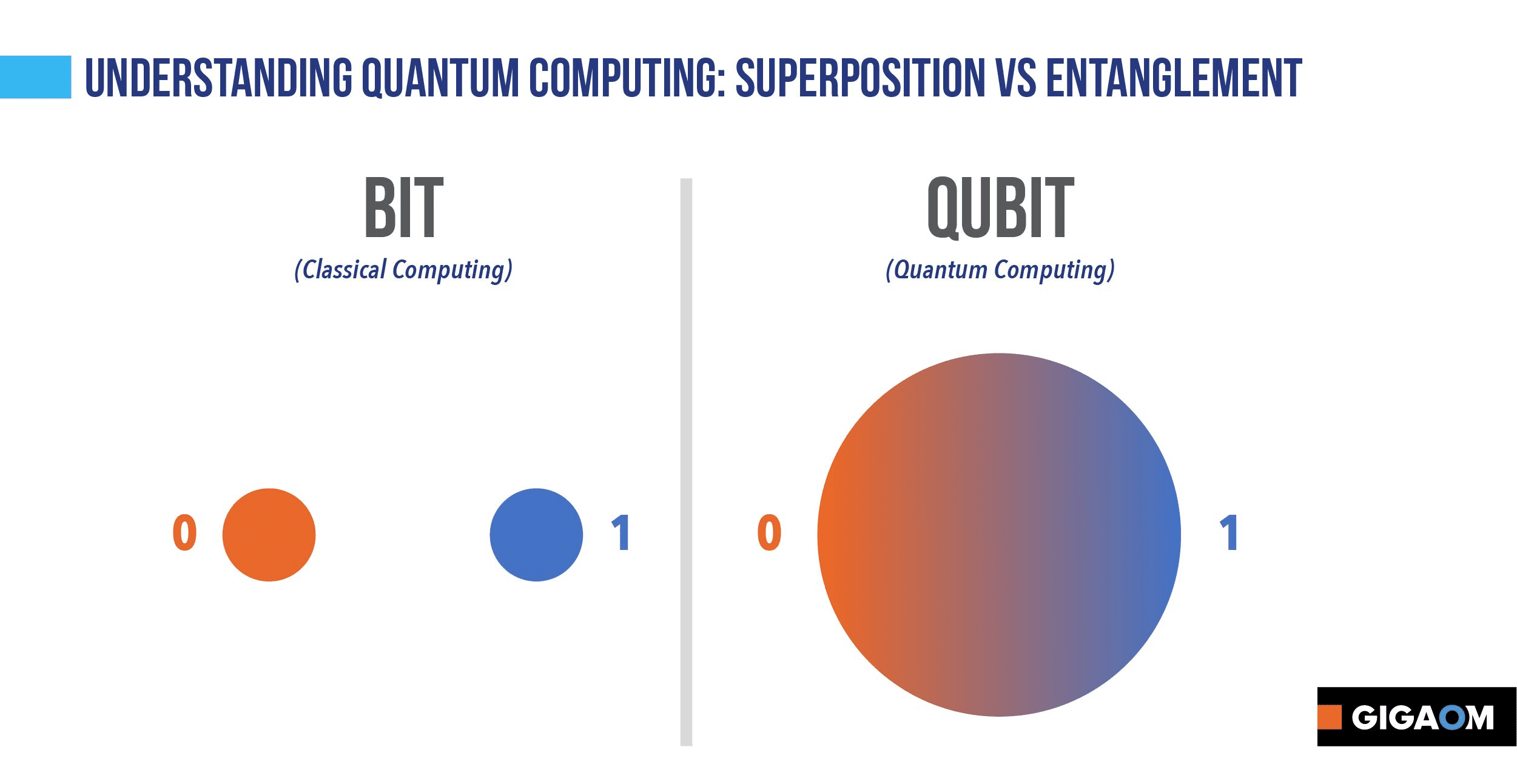Overview
What it is: A new, currently immature and costly, form of computer processing based on quantum effects.This type of computing is able to solve highly complex problems that are currently unsolvable within reasonable time constraints.
What is does: Quantum computers are optimized for solving certain types of problems, especially those of encryption, communication, and complex system modeling. Since the foundations of quantum computing are fundamentally different from classical computing, new programming paradigms and languages are both enabled and required. Quantum processors are constructed from individual electrons, photons, trapped ions, semiconducting circuits, etc. They generally must maintain temperatures approaching absolute zero to achieve a quantum state.
Why it matters: Enables new kinds of problems to be solved, particularly those involving massive parallelism.
What to do about it: Keep a watch until costs fall and clear use cases emerge.
Applications
Quantum computers aren’t designed for all tasks. Most applications focus on the following:
- Encryption: Large Number Factoring
- Machine Learning
- Financial Forecasting
- Pharmaceutical Development
Plus the ability to solve problems that haven’t yet been imagined.
How It Works
The advantages of quantum computing arise from the principles of superposition and entanglement.
Superposition. The smallest unit of information in classical computing is the bit. It can exist in one of two states, zero or one. A quantum bit (aka qubit) leverages superposition, i.e. the ability for a particle to exist in multiple states at the same time. Since a qubit can be zero, one, and everything in between, it can store vastly more information than a bit.
Entanglement. In the quantum realm, certain particles and groups of particles are connected, i.e. entangled, in such a way that an action on one particle affects another, even when the two are separated by long distances. Whereas classical bits are independent, qubits are interconnected, instead of reading each bit individually and then operating on it, a quantum computer can read multiple qubits simultaneously.

Challenges
Whereas a classical computer could run for a decade without a glitch, a quantum computer could encounter a problem milliseconds after booting up.
- Quantum systems are extremely sensitive to interference (or “noise”); any fluctuation in energy, radiation, or even stray photons can cause a computation to collapse (known as “decoherence”).
- Methods to preserve integrity include high-intensity magnetic fields and ultra-cooled environments — neither is cost-effective in larger architectures, but advances in superconducting materials and circuits may soon provide simpler approaches to coherence management.
- Quantum computers face unique challenges in error correction and are susceptible to errors while calculating/transmitting results; where classical processors are regulated by comparing redundant cycles, quantum states cannot be identically reproduced (rendering this method unavailable).
- Quantum errors must be corrected via intricate algorithms and/or ancillary hardware systems – the paradox of the algorithm is that a superior quantum processor might be required to execute the analysis, the problem with hardware is stripping the system’s efficiency by enslaving it to slower authentication devices.
- Researchers are making many advances in error correction, and they may reach a fault-tolerance threshold in the near future.
Time to Market
Impressive milestones have been met in the laboratory.
Yet, because they are currently loud and expensive, no quantum computers are currently available for purchase. However, several corporations and institutions provide online access to their quantum computers. These include IBM Q, Rigetti, and D-Wave. Recently the U.S. Department of Energy announced $40 million in grants for the development of new software and algorithms for quantum computing. Some experts predict that quantum supremacy will be achieved by the end of 2019.
Those to Watch
Today’s leaders in quantum computing are major tech companies and prestigious universities:
Google, Quantum – A research effort from Google AI that aims to build quantum processors and develop novel quantum algorithms to dramatically accelerate computational tasks for machine learning.
Harvard, The Harvard Quantum Initiative in Science and Engineering (HQI) – A community of researchers with an intense interest in advancing the science and engineering of quantum systems and their applications. “Our mission is to help scientists and engineers explore new ways to transform quantum theory into useful systems and devices.”
IBM, Quantum Computing at IBM – IBM Q is an industry first initiative to build universal quantum computers for business, engineering and science. This effort includes advancing the entire quantum computing technology stack and exploring applications to make quantum broadly usable and accessible.
Microsoft, Quantum – Microsoft’s approach prioritizes a long-term, commercially viable quantum solution. “Our unique approach pushes the boundaries of computing to create unprecedented possibilities, from food scarcity and clean energy to cybersecurity and financial risk modeling.”
MIT, The Center for Theoretical Physics – A unified research and teaching center focused on fundamental physics. “Our activities range from string theory and cosmology at the highest energies down through unification and beyond-the-standard-model physics, through the standard model, to QCD, hadrons, quark matter, and nuclei at the low energy scale. Members of the CTP are also currently working on quantum computation and on energy policy.”
Oxford, Oxford Quantum – Oxford University is the UK’s largest and most diverse centre for quantum research. “We have 38 separate research teams, with a total of around 200 researchers. Oxford is therefore one of the world’s largest centres for quantum science.”
More Resources
- Quantum Computing for Everyone, by Chris Bernhardt. The MIT Press. March 2019.